
The death penalty was once the go-to punishment for a wide range of crimes in most countries of the world. Today, only about 28% of countries still practice capital punishment, but that includes some of the world’s great powers: the United States, China, and India. We have a comprehensive list for you, along with the methods used.
24/7 Wall St. Insights
- The practice of the death penalty is more limited than ever, both in the number of countries that practice it and the crimes it is applied to.
- Methods of capital punishment differ around the world. Countries generally practice it in more humane ways than in ancient times, due to international standards and pressure.
- Also: 2 Dividend Legends To Hold Forever
What’s the Point?
This information can be useful if you want to lobby to change your state or country’s policy on capital punishment or if you want to adjust your spending, investment, and travel plans to avoid supporting countries that differ from your convictions. It can also influence how you view the status of political asylum-seekers if deporting them back to their country could lead to their death.
Arguments For Capital Punishment
One of the main arguments for capital punishment is that it will serve as a deterrent to other criminals thinking of committing similar crimes. When it is applied to offenses where someone took another person’s life, many people think it is only fitting that the murderer should also have to forfeit their life. Sometimes this is rooted in religious conceptions, sometimes in a sense of concern for closure for the families of victims, and sometimes just from a general sense of fairness and justice.
Proponents of the death penalty also resent the fact that taxpayers have to support violent criminals for the rest of their lives, providing not only the basics but often amenities like entertainment, education, and other kinds of self-improvement opportunities. The public also has a great deal of fear that violent criminals will be released on parole or escape and commit similar crimes. Executing those prisoners is a way to protect the public permanently from them.
Arguments Against Capital Punishment

The death penalty has not actually been proven to be any more effective at deterring violent crime than a life prison sentence. For either penalty to be a deterrent would require that a person slow down and think about their actions. Violent crimes, however, are often crimes of passion or opportunity where short-term emotional impulses, rather than rational thought, are driving a person’s behavior.
Other concerns about capital punishment are that DNA evidence has overturned many previous sentences, proving that the justice system at times makes significant mistakes and could convict and execute an innocent person. There is also concern that the death penalty is applied differently in different places and to different demographics. So for example, in the United States, in one state a person may receive life in prison, while the same crime committed just over the border may result in the death penalty. And studies show that convictions for capital offenses are often higher for ethnic minorities and people of less financial means.
Finally, many people oppose capital punishment for moral reasons, either based in religion or a general conviction that killing for any reason is wrong. It amounts to committing the same offense we find intolerable to the person who did it.
World Death Penalty Statistics
193 countries are members of the United Nations and 2 more are observers. This map illustrates the practice of the death penalty around the world. The most common methods of execution are hanging or shooting. Because of differences in state laws, the United States practices the widest variety of capital punishment methods.
- Red: 54 countries actively implement capital punishment.
- Light Green: 9 countries practice the death penalty only for exceptional circumstances like war crimes.
- Brown: 23 countries still have the death penalty on their books but have not practiced it for 10 or more years.
- Dark Green: 109 countries have completely abolished capital punishment
Next up are all the countries of the world from the first category listed above, organized by region.
The Death Penalty in Africa
12 African countries, mainly in the northeast and central parts of the continent, practice capital punishment. These are those countries, the method used, and the last date an execution took place.
- Botswana: hanging (2021)
- Comoros: firing squad (1997)
- Congo, Democratic Republic: hanging, shooting (2003)
- Egypt: hanging, firing squad (2024)
- Ethiopia: firing squad (2007)
- Lesotho: hanging (1995)
- Libya: firing squad (2010)
- Nigeria: hanging, firing squad, stoning, lethal injection (2016)
- Somalia: hanging, firing squad, stoning (2023)
- South Sudan: hanging, firing squad (2022)
- Sudan: garrotte (2021)
- Uganda: hanging, shooting (2005)
The Death Penalty in Asia
In East, Southeast, and South Asia, 15 countries still have the death penalty. See the list below, along with the methods practiced and the last date of an execution.
- Afghanistan: hanging, shooting, stoning (2024)
- Bangladesh: hanging (2023)
- China: shooting, lethal injection (2024)
- India: hanging, shooting (2020)
- Indonesia: firing squad (2016)
- Japan: hanging (2022)
- Malaysia: hanging (2017)
- Maldivies: hanging (1952)
- Myanmar: hanging (2022)
- North Korea: firing squad, hanging, decapitation (2023)
- Pakistan: hanging (2019)
- Singapore: hanging (2024)
- Taiwan: shooting, lethal injection (2020)
- Thailand: lethal injection (2018)
- Vietnam: lethal injection (2023)
The Death Penalty in the Caribbean
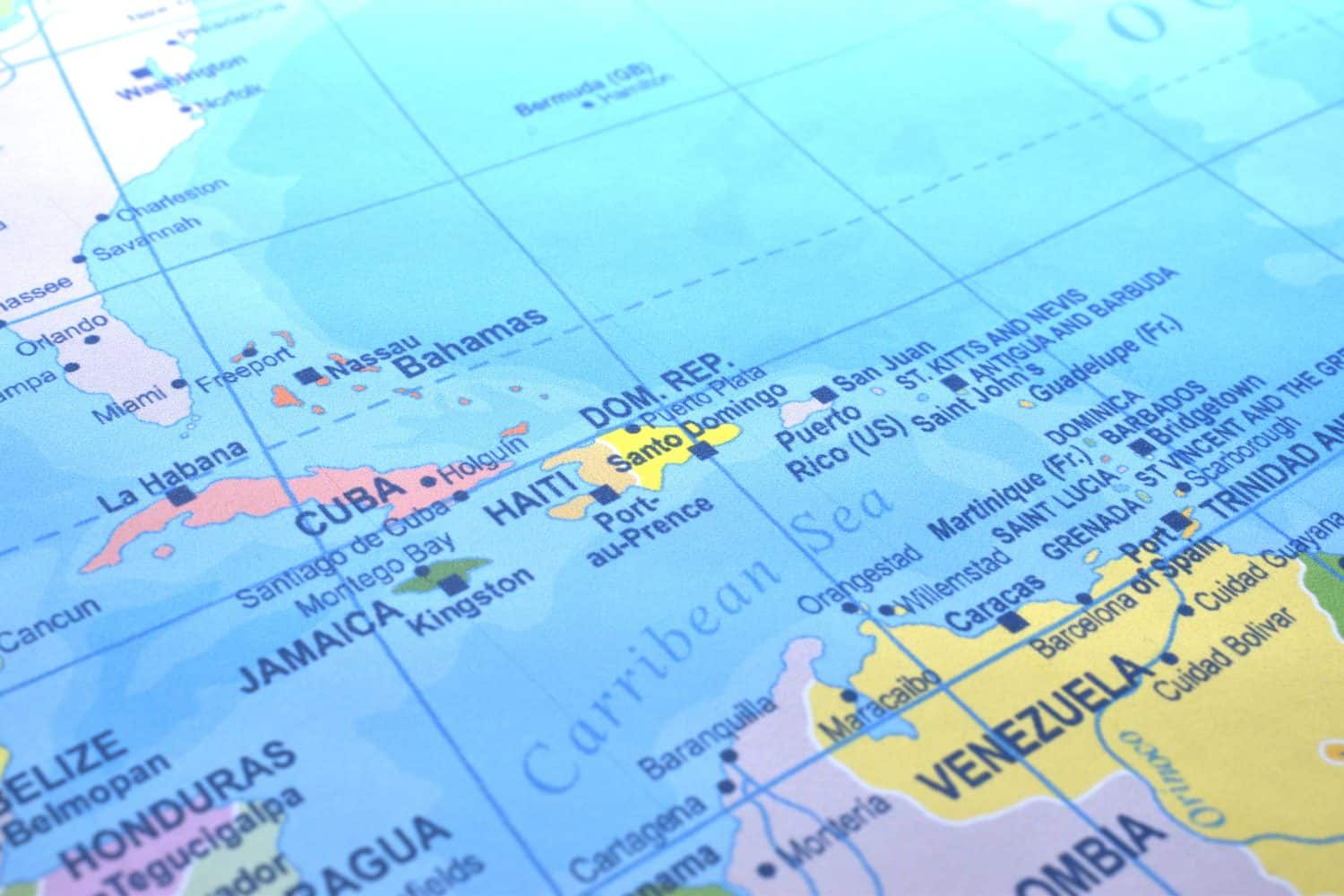
10 Caribbean island countries have capital punishment. Most of these are former British colonies. Here are the countries, methods, and latest execution dates for each.
- Antigua and Barbuda: hanging (1991)
- Bahamas: hanging (2000)
- Barbados: hanging (1984)
- Cuba: firing squad (2003)
- Dominica: hanging (1986)
- Jamaica: hanging (1988)
- St. Kitts and Nevis: hanging (2008)
- St. Lucia: hanging (1995)
- Saint Vincent and the Grenadines: hanging (1995)
- Trinidad and Tobago: hanging (1999)
The Death Penalty in Central America
Of the 7 countries in Central America, only Belize, a former British colony, has capital punishment. They use hanging, and last carried an execution out in 1985.
The Death Penalty in the Middle East
12 countries in the Middle East carry out the death penalty. Decapitation and stoning are execution practices unique to some of the countries in this region. Some, such as Iran, also practice public executions. Here are the capital punishment countries, methods, and date of latest execution:
- Bahrain: hanging, firing squad (2019)
- Iran: hanging, shooting, stoning (2024)
- Iraq: hanging (2022)
- Jordan: hanging, shooting (2021)
- Kuwait: hanging (2023)
- Lebanon: hanging, firing squad (2004)
- Oman: decapitation (2021)
- Qatar: firing squad (2020)
- Saudi Arabia: decapitation, firing squad (2024)
- Syria: hanging (2022)
- United Arab Emirates: firing squad (2017)
- Yemen: shooting, stoning (2024)
The Death Penalty in Europe
The only European country still using capital punishment is Belarus. The method used is shooting, and the last execution took place in 2022. Belarus is a dictatorship and a close ally of Russia. Although capital punishment is still in Russia’s legal code, it has not been officially practiced for more than 10 years.
The Death Penalty in North America

The United States is the only North American country with capital punishment, but this is determined at the state level so the practice is not consistent. 24 states still use the death penalty, but in 3 other states where it is still on the books, it is not actually practiced anymore. Depending on the state, prisoners can face lethal injection, the electric chair, a firing squad, the gas chamber, inert gas asphyxiation. The latest execution in the U.S. took place in Alabama on September 26, 2024. Texas has carried out the most of any state: more than 570 in the past 50 years.
The Death Penalty in South America

Guyana, a former British colony, is the only South American country practicing the death penalty. The last execution to take place there was in 1997. Guyana’s method of execution is hanging.
Take Charge of Your Retirement In Just A Few Minutes (Sponsor)
Retirement planning doesn’t have to feel overwhelming. The key is finding expert guidance—and SmartAsset’s simple quiz makes it easier than ever for you to connect with a vetted financial advisor.
Here’s how it works:
- Answer a Few Simple Questions. Tell us a bit about your goals and preferences—it only takes a few minutes!
- Get Matched with Vetted Advisors Our smart tool matches you with up to three pre-screened, vetted advisors who serve your area and are held to a fiduciary standard to act in your best interests. Click here to begin
- Choose Your Fit Review their profiles, schedule an introductory call (or meet in person), and select the advisor who feel is right for you.
Why wait? Start building the retirement you’ve always dreamed of. Click here to get started today!
Thank you for reading! Have some feedback for us?
Contact the 24/7 Wall St. editorial team.
